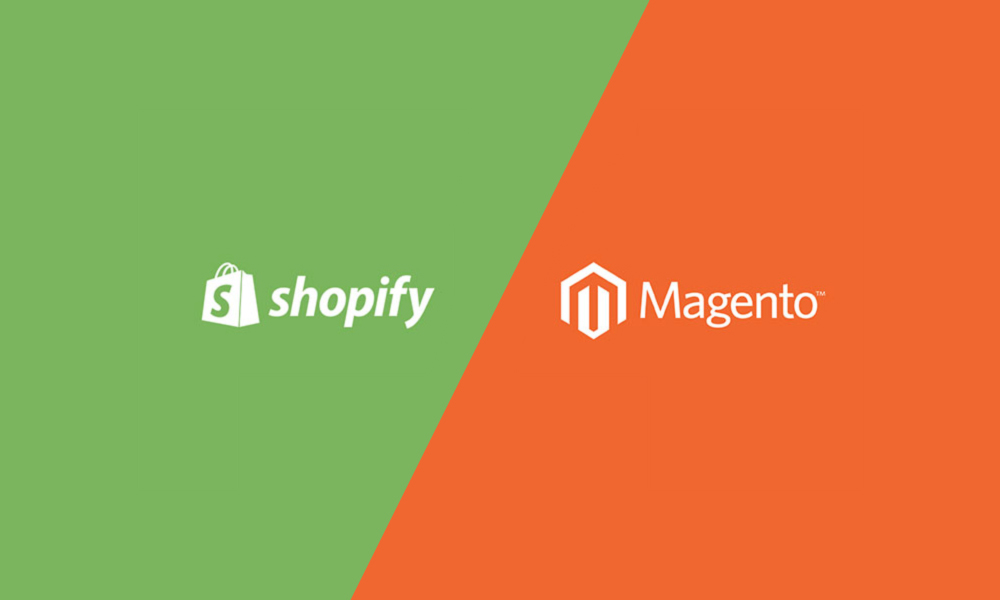E-commerce is a hot business trend and merchants across the globe are keen to jump on the bandwagon. Even those already running successful brick-and-mortar stores are looking to supplement their businesses with an online presence. With this approach comes the increasing demand for robust and result-oriented online stores. The choice of the development platform is the most critical factor that determines the fate of an online business. Now the biggest question for those looking for creating new ones or revamping the existing ones is to shortlist the best ecommerce platforms in 2018.
The choices in the market are extensive, but Magento and Shopify emerge as the two most popular e-commerce platforms. Perhaps this is the reason that the two of them often pitted against each other and merchants are curious about both of them. If you are planning to use one of these as the foundation of your e-store, a comparison between the two is a must. Let’s go ahead with an overview of magento vs shopify in 2018 so that you can know them both and choose the one that works for you. We are going to compare them on the basis of certain parameters.
Support Services
Another factor that influences the choice of platform is the support service it offers. With Shopify, you can avail 24/7 technical support via email, phone, or live chat. Conversely, there is no official customer support service for Magento. However, you can get extensive support from the large certified Magento developer community that the platform is so well known for. It has plenty of documentation and special forums to answer all the queries.
Pricing
Pricing is perhaps the most significant metric that impacts the decision related to the choice of an e-commerce platform. Magento is an apt choice for those looking for economical options as the Community Edition comes free while the cost of Enterprise Edition depends on the complexity of the store’s needs. Shopify, on the other hand, is a software-as-a-service (SAAS) priced on a monthly subscription model. Its packages include Basic ($29/month), Pro ($79/month), and Unlimited $179/month.
Ease of Use
When it comes to ease of use, Shopify definitely scores higher because it is more like a website-building tool that enables non-developers to create feature-rich online stores. Magento requires some coding knowledge but it is a small price to pay considering the flexibility it offers. There are several additional features that you can render in your online store by using ready-made extensions and third-party plugins. Magento 2 comes with a user-friendly admin panel that facilitates the entire e-commerce functions for the merchant.
Design and Branding
The look of your online store determines its ability to sell and adds to the brand value. Here, it becomes important to look for a platform that offers the choicest themes to create eye-catching designs. Both Magento and Shopify comes with a number of free and premium themes, many of which are responsive. However, Shopify themes lack in respect of customizability as they do not allow much of tweaking. Besides offering high-end themes, the latest Magento 2 version brings drag and drop visual editing function, which enables the creation of beautiful sites even by non-coders.
Scalability and Capability
Shopify is a better choice for small businesses that want to rely lesser on technical resources. This is a plug-and-play platform that presents everything as ready-made and needs you to just put together add-ons. Magento wins the game for large and complex stores with multiple requirements. Again, Magento 2 is widely appreciated for its scalability and should be chosen if you plan to expand in future.
SEO
When it comes to SEO compatibility, Shopify is an excellent platform which offers basic and advanced SEO features in its plans. Magento too is a fully SEO-optimized e-commerce platform which supports extensive SEO functionality. Besides basic settings, it brings some advanced SEO options, such as image optimization, robots.txt files, canonical tags for separate products and categories and products, and meta tags for home page and products.
Conclusion
With e-commerce platforms, there is nothing like a one-size-fits-all approach. The answer to Magento vs Shopify really depends on your requirements, budget, and business goals. Shopify definitely fits the needs of merchants who look for convenience and simplicity for their small e-stores. But still, it is suggested that Magento should be opted by growing businesses that plan to extend their stores with more features in the future. In fact, the new Magento 2 version brings such amazing improvements that it makes an ideal choice for modern e-commerce businesses.

